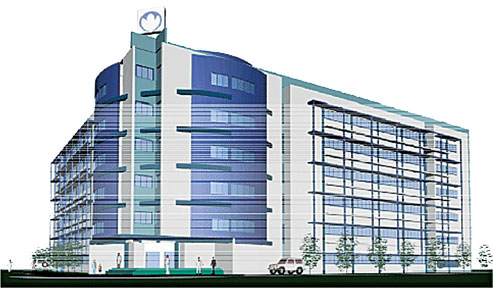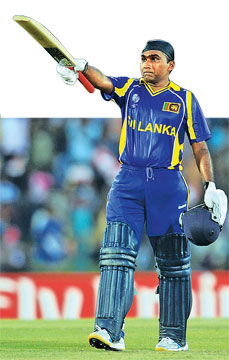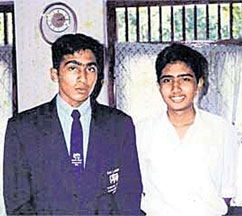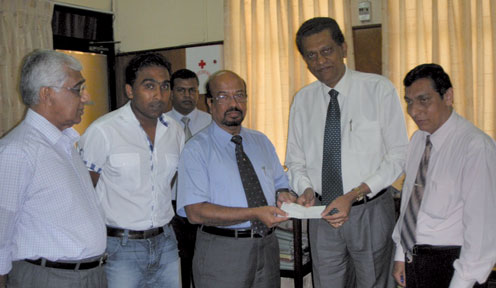A ray of HOPE for cancer patients
By Nilma DOLE
|

A computer-generated image of the hospital
|
My first meeting with Mahela Jayawardene was surprisingly, not on an
international cricket pitch or amidst enthusiastic fans scampering to
get an a utograph
from one of Sri Lanka's most famous and talented cricketers. utograph
from one of Sri Lanka's most famous and talented cricketers.
It was at a meeting at the Ministry of Health, where Mahela, his
father Senarath and Upali Samarasinghe of the Lions Club of Colombo
Somerset presented Rs. 21 million to complete building the HOPE Cancer
Hospital.
The hospital adjoins the Maharagama Cancer Hospital and was Mahela's
dream come true to give hope and a better tomorrow to children stricken
with cancer.
This shows that there is definitely more to Mahela than what meets
the eye. Beneath that tough exterior of a renowned cricket star, is the
soft corner Mahela has for his beloved brother, Dhisal.
In 1994, Mahela gained recognition as the runner-up of the Sunday
Observer Schoolboy Cricketer, but the year after was going to be one of
the toughest of his life. In 1995, Mahela lost his brother Dhisal, but
the same year heralded the beginning of his cricketing career, playing
for the Sinhalese Sports Club.
"Losing my brother due to cancer was the most traumatic experience of
my life. It left me with a sense of helplessness, which slowly turned to
anger: Anger at the lack of facilities and the unspeakable anguish faced
by the sufferers' loved ones," said Mahela, who still carries a
photograph of Dhisal in his wallet.
It was trauma for the entire family when Mahela's parents, Sunila and
Senarath, admitted Dhisal to London’s Atkinson Morley Hospital because
of his brain tumour. Dhisal's brain tumour was unusual where symptoms
surfaced only after he was 16 years old.
|

Mahela and Dhisal |
"He had to undergo surgery in London, but the tumour returned seven
months later. We went to Nawaloka for chemotherapy, but were told that
he didn't have many days to live," said an emotional Senarath, a former
technical officer at the Sri Lanka Rupavahini Corporation.
Amidst family trauma, Mahela somehow found the ground to stand on and
continued to perform to the best of his ability on the pitch, which gave
him the courage to go on to captain Sri Lanka.
"Dhisal, a left-handed batsman, was a great cricketer and my
grandfather always says he was better than me. When he was 14 Dhisal was
the opening batsman for Nalanda college whereas I was the captain. He
was too sick to play at 15 and 16, but we had a special season
together," said Mahela.
Life-changing experience
For Mahela as a teenager, the experience made him look at the world
differently because his family went through a traumatic time for nearly
two years, flying to the UK for treatment, but losing Dhisal to cancer
later. Mahela said, "How many people have the chance to go for this sort
of operation? I see many families struggle without this chance and so we
want to help other people."
Even though they were fortunate that they could afford to treat
Dhisal in London, there are thousands in Sri Lanka who can't afford to
do so and suffer in silence with no hope. Senarath said that when he
went to the Maharagama Cancer Hospital to donate Dhisal’s medicine, he
realised that it wasn't only his son fighting a lone battle.
“We saw the plight of children and witnessed from close quarters so
many middle-aged people suffering. I had the money to at least try to
treat my son but what about the impoverished? The doctors wanted me to
introduce an award in memory of Dhisal, but Mahela thought we could do
something better.”
In this sense, the mission of HOPE is “To harness technology and
professionalism to stir hope, the essential element of human living for
people who face death.”
Having set up the HOPE Charity Fund in March 2002, it was a
formidable task to get the ball rolling with Mahela's cricketing career
reaching a pinnacle, but also finding donors and campaigning for HOPE.
|

Presenting the cheque at the Health Ministry |
In April 2002, an agreement was signed with the government of Sri
Lanka, under the purview of the Lions Club of Colombo Somerset, to
allocate two acres of land at the Maharagama Institute of Cancer to
build the HOPE Hospital.
"We started collecting money by selling tickets on the streets of
Colombo and from my cricketing colleagues. By December 2004, over Rs. 40
million had been collected, but charity funding was halted after the
tsunami," said Mahela, who himself had contributed Rs.15 million.
Despite the temporary lull, Mahela commenced funding for the project,
which he says is closest to his heart.
"We had a good opportunity when a party from the Middle East wanted
to donate US$ 15 million, but they suddenly pulled out due to financial
issues on their side. But we didn't lose hope and managed to look for
individual donors too," said Mahela. In addition to Mahela's parents,
his wife Christina has also been a pillar of strength in raising funds
and making HOPE a reality.
Mahela, the cricketer
The foundation of the HOPE Cancer Hospital building has already been
laid and work will be completed as Rs. 21 million has been handed over
to the Ministry of Health.
Receiving many awards in his international cricket career, including
the ICC's Captain of the Year 2006 inaugural award, Captain of the
'World One-Day International Team of the Year 2006', Captain of the
'Spirit of Cricket Award 2007' team, Wisden Cricketer of the Year 2007
and holding the record for the highest score (374 runs) by a Sri Lankan
in Test cricket, Mahela is a cricketer par excellence. He said his love
for his brother continues to keep him going and encourages him that the
HOPE project will be completed soon.
Mahela said, "We all wanted to do what we could to change the sad
plight of cancer patients in Sri Lanka and personally build a monument
of remembrance to my dear brother. We had, and still have, a vision of
Sri Lankan victims of this terrible illness, having world- class
facilities, medical care and emotional support."
The HOPE Cancer Hospital project has been split into two stages with
help from a group of South African experts. Initially starting as a
450-bed ward, it will progress to a 750-bed clinical oncology ward along
with an iodine ward. Two radiotherapy machines will be built alongside
modern diagnostic treatment and ancillary facilities, covering 8,000
square metres, to be built at an estimated cost of US$ 4.7 million.
"The essence of HOPE is to give Sri Lankans a real fighting chance
against cancer. Together we can make it a reality," said Mahela. He
doesn't take credit for the project himself, but takes it as a silent
call of duty that he won't rest until the project sees the light of day. |

